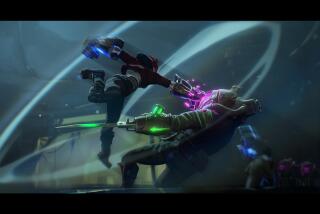DIC Shows Get Good Reception in China : Television: The Burbank entertainment company is finding success selling its children’s shows to overseas markets.
- Share via
BURBANK — Selling children’s TV shows overseas is full of surprises, as Andy Heyward, chief executive officer of DIC Entertainment can readily testify.
*
Last fall, his Burbank-based company started televising its cartoons and children’s shows on cable and over-the-air television in China. “One of the shows . . . was ‘Dennis the Menace.’ They looked at it and they said, ‘Well, this wouldn’t be acceptable for our market,’ ” Heyward said.
“I was surprised, because it’s kind of a cute, innocuous little show, not violent, or any of the things that they might find objectionable. So, we said, Why? They said, ‘You know, we don’t have kids like that here and we don’t want them!’ ”
DIC now provides 19 hours of programming a week on two Chinese TV operations, making it one of the biggest forays by an American animation company into the fledgling, potentially vast China television market. All the shows are dubbed into Mandarin Chinese, with DIC helping to set up a studio in Beijing to do the work.
*
DIC is a prolific supplier of children’s programming to domestic and international markets, and its venture into China was helped by the fact that DIC is now majority-owned by Capital Cities/ABC Inc., the $6-billion parent company that runs ABC television. DIC is known for such popular animated shows as “Inspector Gadget,” “Adventures of Sonic the Hedgehog” and “Where on Earth is Carmen Sandiego?,” as well as live-action shows like “Zoobilee Zoo” and “Rimba’s Island.”
DIC has long been pushing into overseas markets. Many production companies don’t make profits off U.S. network shows; it’s only after their shows are later sold into foreign and syndication markets that the profits come.
DIC (pronounced “deek”) is a survivor, having endured various ups and downs in the animation business. Heyward, 46, led a $70-million leveraged buyout of the company in 1987 from Radio-Television Luxembourg and French businessman Jean Chalopin, who co-founded DIC with Heyward. Then two years ago, Capital Cities bought control of DIC.
With new networks and stations opening up at a furious pace around the world, overseas broadcasters are increasingly looking to American producers to supply a seemingly insatiable appetite for new shows. They are also increasingly interested in gaining American expertise in production, marketing and programming.
The Chinese also bought a batch of children’s programming from the Walt Disney Co. a few years ago. In the late ‘80s, Disney had shows on the main Chinese government-operated TV network showing Mickey Mouse and Donald Duck cartoons. In April, Disney also started providing one hour of TV programming a week on two regional Chinese stations. And foreign-owned satellite services have beamed in various shows with Chinese subtitles. However, China’s deal with ABC and DIC seems to be their most far-reaching to date.
Both DIC and ABC have been doing business in China for years. ABC has been there since 1987, selling various programs and building relationships with the local entertainment community.
And DIC has long subcontracted much of the labor-intensive animation work for its shows to Asian studios, including several in China, because of the low cost. So far, about 200 half-hour DIC programs have been animated at Hong Ying, a studio based in Soochow.
It was this relationship that made DIC a very desirable partner for the Chinese. Key to the DIC/ABC venture’s success, though, was bringing on board two former China Film executives, Jun Tang and Xiaolin Chen, who now oversee day-to-day operations. Jun Tang works out of an office in New York, while Xiaolin Chen runs the Beijing operation with a staff of about 12 people.
The cartoons are shown in two different batches of time slots--one is called the Dragon Club, the other the Panda Club. Both have local Chinese hosts who introduce the various DIC cartoons.
The two new programs also have advertising, which is relatively new on Chinese TV. DIC and ABC help sell advertising for the programs, which are joint ventures of DIC and ABC with local government-owned broadcasters, and they share the ad revenue. Ads include those for toys and packaged foods, produced both by western and Chinese companies. The Dragon Club is seen on 29 of China’s 30 cable outlets, while the Panda Club appears on over-the-air TV stations.
The initial batch of programs for the Panda and Dragon clubs include such DIC cartoon staples as “Madeline,” about a young French girl in a boarding school, “Superhuman Sybersquad,” “Adventures of Sonic the Hedgehog,” based on a Sega Enterprises video game, and “Super Mario Bros.”
There is really no accurate way of measuring the size of the Chinese viewing audience as China lacks the equivalent of the Nielsen ratings. Heyward recalls that “in trying to measure the number of homes being reached, we found out that they might count Plumbing Factory No. 712, where they have 2,000 people, as one household. Because it’s wired up to the cable, it’s considered one household!”
Nevertheless, Heyward feels the shows are “successful by all the measurements we’ve been given.” He notes that the host of the Panda Club is “mobbed everywhere she goes.”
More to Read
The biggest entertainment stories
Get our big stories about Hollywood, film, television, music, arts, culture and more right in your inbox as soon as they publish.
You may occasionally receive promotional content from the Los Angeles Times.










